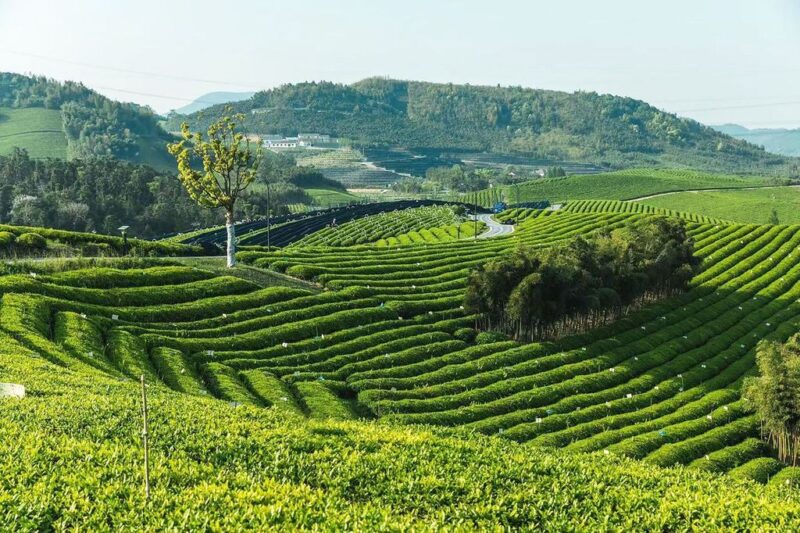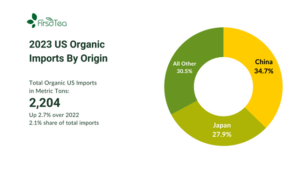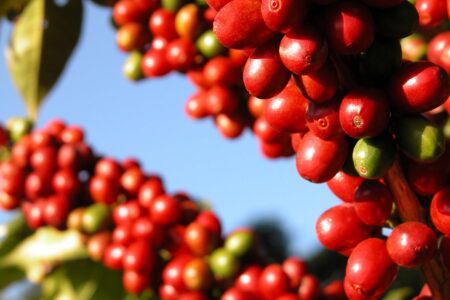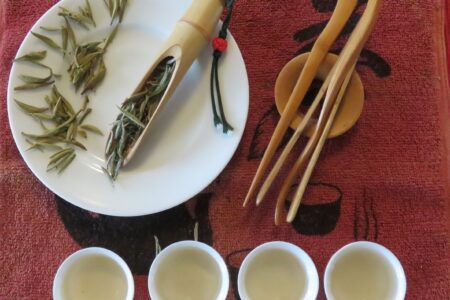Strengthening organic enforcement: impact on the organic tea supply chain

Transworld Tea's organic tea field in Zheziang Province, China. Image credit: Firsd Tea
The USDA Strengthening Organic Enforcement rule took effect last month and its implications will be felt throughout the entire organic tea supply chain. By Jason Walker
On 19 January 2023, the United States Department of Agriculture (USDA) National Organic Program issued the Strengthening Organic Enforcement (SOE) final rule. This new regulation aims to improve oversight of the organic supply chain and reduce fraud by increasing traceability and transparency. The final rule went into full implementation on 19 March 2024. These changes will be felt by every tea business that produces, processes and handles organic teas. The rules will apply to USDA organic Camellia sinensis products and USDA organic botanicals used in tea blends and tisanes. Since the US imports the vast majority of its teas, organic tea businesses across the globe will now have to comply with these new regulations aimed at preventing fraud in the organic supply chain.
Past issues
For years, the National Organic Program (NOP) has made strides in addressing the challenges of programme implementation. A 2010 review of the organic programme by the Office of Inspector General (OIG) found that certifying agents were not conducting regular and consistent, periodic residue testing, and in some cases were not conducting required onsite assessments of certified operations.
The USDA OIG assessment report included recommended remedies, and issues were addressed. A subsequent 2017 report concluded that overseas organic equivalency standards were not sufficiently transparent, and that NOP import documentation was not consistently verified at ports of entry.
Furthermore, some certified organic products being imported may have been fumigated with treatments that were not compliant with organic standards. This fumigation may have been necessary from a Customs and Border Protection perspective but would have rendered these products as no longer compliant with NOP organic standards. The need for fumigation occurs less frequently with Camellia sinensis products but may be necessary with certain botanical ingredients used in tea blends and herbal tea blends. As such, these past issues impacted the US organic tea industry to varying degrees.
The potential for fraud has been another significant and ongoing concern. Not only do fraudulent organic products de-value the perception of the organic brand, but high enough volumes can affect the pricing of organic products. When fraudulent organic products can be produced and sold at cheaper prices than authentic organic products, this raises the risk that legitimate organic producers get pushed out of business.
Changes in the strengthening organic enforcement (SOE) rule
Some of the major changes included in the SOE regulations that will impact the tea industry include:
- Exemptions: Under the old regulations more entities along the supply chain could be considered exempt, especially if they were handling the finished, packaged product and not coming in contact with the actual raw materials (leaf in the case of tea). Under the new regulations, organisations that sell in bulk from the farms, load/unload, store/warehouse, transport, and repackage organic products will likely need to be organic certified. To be clear, not all warehouses holding organic tea will necessarily need to be certified organic. Not all ocean container ships transporting organic tea will need to be certified. The best way to understand what exemptions are allowed under the new SOE regulations is for tea companies to contact their organic certifying agent for clarification.
- Traceability, Fraud Prevention and Inspections: Operations must include a fraud prevention plan as part of their organic system plan. During annual inspections, inspectors will conduct ‘in-out’ and ‘trace-back’ audits. These audits aim to verify that correct volumes of organic materials are accounted for coming in and out of the operator’s facilities. Inspections must also verify the organic products and organic ingredients are compliant back to the previously certified operation in the supply chain. In addition, certifying agents/organisations must also identify ‘high risk’ operations and products. High-risk products may come under greater scrutiny as they are traced throughout the supply chain.
- NOP Import Certificates (NOPIC): The NOPIC may be one of the newer and more significant changes affecting how certifier organisations in the country export get involved in the documentation of organic tea from origin. Imported organic products must be declared to the US Customs and Border Protection’s Automated Commercial Environment (ACE) system using data from a NOPIC that is to be generated by the exporter’s certifying agent/organisation.
Since the majority of the US’s organic tea is exported from a few major producing countries, the new NOPIC requirement could affect the timeliness and costs related to the import/export process. A representative of Ecocert USA, which provides selected organic, fair trade and social responsibility programs and certification services, was contacted to explore how the NOPIC may impact the flow of tea imports into the US.

Graph courtesy of Firsd Tea
Will a rise in demand for organic exports following the Spring tea harvest and the associated requests in NOPICs create delays or the need for more processing times for exports?
Ecocert spokesperson: Starting March 2024, exports to the USA shall be accompanied by a NOP Import Certificate (NOPIC). Before issuing a NOPIC, the certification agency will define specific verifications to confirm the compliance of the goods. Concerning Ecocert, the level of verifications may depend on the risk of the supply chain in question. The riskier the supply chain, the more robust the verifications before issuing the NOPIC. This administrative step to obtain the NOPIC, which was not required beforehand, will need to be anticipated by the exporter to avoid any delays.
As such, it would seem that the infrastructure and systems for processing NOPIC requests is considered robust and sufficient, but delays could be related to certifiers’ (of exporters) level of familiarity with the submission process and the varying degrees of compliance documentation that is required. Only the certifiers of exporters, not the certified organic tea exporting organisation itself, will be uploading documentation and requesting the NOPIC. Any organisation or product that has been deemed high-risk by the certifying organisations may require the certifier of export to submit more extensive documentation with the NOPIC request.
At what point in the process does the NOPIC need to be received by the exporter and/or importer? Before leaving the country of origin? On landing in the US? Other?
Ecocert spokesperson: There is no rule defined in the SOE about the reception date. The only date is about the NOPIC requesting date. Per 205.273(a) of the SOE regulations: The NOP finally indicated [in March] that the NOPIC should finally be issued ‘before departure’ which is different than what is written in the requirement. It is also mentioned that each import must ‘be associated with valid NOP Import Certificate data’ while being declared as organic to US Customs and Border Protection (on the ACE portal).
Certifying agents determine their own fees in terms of processing/verifying NOP import certificates. Is there a consensus across certifying agents in various countries as to standardizing the fees/rates?
Ecocert spokesperson: At the time of writing, there is no consensus on the fees related to the issuance of NOP Import Certificates (NOPIC) among certifying agents. Each certifying agent will communicate the fees to their clients once they are defined.
Value of SOE Regulations
As the SOE regulations go into effect, operations in the certified organic supply chain have been made aware of the changes needed to comply with the new rules. Overall, the new rules seek to improve compliance and security of the organic supply chain while imposing as little added administrative burden as possible. Operations involved in USDA organic certified tea can expect the need to process more documentation and (perhaps) an increase in surprise inspections.
It is worth noting that the SOE regulations are designed to increase traceability, but not necessarily transparency. In most cases, certified organic operations are required to document traceability back to the most recent certified upstream operation. Neither operators nor consumers can necessarily expect to have access to records that visibly trace a product through all the actors in the supply chain back to origin.
The tea industry will not be the only agricultural product affected by the roll out of these new regulations, but considering the US imports nearly all of its organic Camellia sinensis and a significant number of organic botanicals used in teas and herbal tea blends, the effects may be more widespread. Each year, about two percent of Camellia sinensis import volumes are organic, but that share rises to eight or nine percent of the total value of tea imports.
Since these imports arrive from various countries with the potential for multiple certifying agents active in those countries, some countries and tea suppliers may vary in terms of adapting to these changes. US organic tea operations that are concerned about these changes are advised to reach out to their certifying agent organization and the certified organisations in their supply chain to better understand any potential impacts to their businesses.
- Jason Walker is marketing director of Firsd Tea North America. Prior to his work with Firsd Tea, Walker served in a variety of roles in tea and beverage business capacities. His experience includes business services for small tea companies, a top-ranked online destination for tea consumer education and co-founding a coffee business. His insights draw upon his diverse range of experience in sales, operations and management in the tea world. He may be reached at: [email protected].



